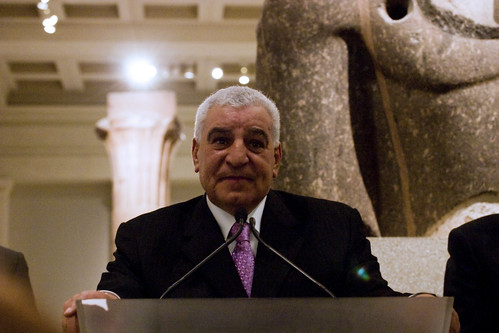Does Zahi Hawass want the Rosetta Stone on loan or not? It’s hard to know if you read the news often enough. Last night saw Egypt’s antiquities boss come to the British Museum in London to promote his new book A Secret Voyage. Yet among the niceties between Dr Hawass and BM director Neil MacGregor, trouble was already brewing behind the scenes.
And while Dr Hawass, who has stepped up his quest to bring Egypt’s greatest treasures home, insisted he wasn’t in London for the Rosetta Stone, he couldn’t help stepping in front of BBC cameras to stake his country’s claim for the fabled basalt slab, the key that unlocked ancient Egyptian language.
“I want the Rosetta Stone to be back, its a unique artefact,” says Dr Hawass. “Its home should not be the British Museum in London, its home should be Cairo, in Egypt.” The BBC then reported that Dr Hawass would be willing to drop his requests for permanent repatriation, as long as the BM agreed to a loan deal, possibly to coincide with the Grand Egyptian Museum’s proposed 2013 opening.
Yet a later appearance, this time on the BBC’s radio service, seems to contradict Dr Hawass‘ earlier statement, bringing in a letter the British Museum allegedly sent in reply to his loan request.
“When I said…I want to have it on a short-term loan, the British Museum wrote a letter to say that they need to know the security of the museum that will host.
“Even some people in the press began to say: ‘If the British Museum will give the Rosetta Stone to Egypt, maybe Egyptians will not return it back.’ We are not the pirates of the Caribbean. We are a civilised country. If I…sign a contract with the British Museum, (we) will return it. Therefore we decided not to host the Rosetta Stone, but to ask for the Rosetta Stone to come back for good to Egypt.”
This sudden about-turn is hardly likely to endear the British Museum, whose officials have repeatedly insisted the Rosetta Stone is better viewed in a global context. “The principle is exactly the same, be it the Parthenon Marbles or the Rosetta Stone, or any object in the collection,” says the museum’s PR chief Hannah Boulton. “The value of that object is because you can see it within this world collection here at the British Museum, and it can tell you a wider story about cultural achievement through the ages.”
What will be the next twist in this long-running saga? Whatever it is, you’re sure to find it here at Heritage Key. The issue of repatriation is one of culture’s hottest topics and shows no sign of fading away. Click here to join the debate at Heritage Key, and have your say on our discussion page. You can always in the box below, or email me direct.
